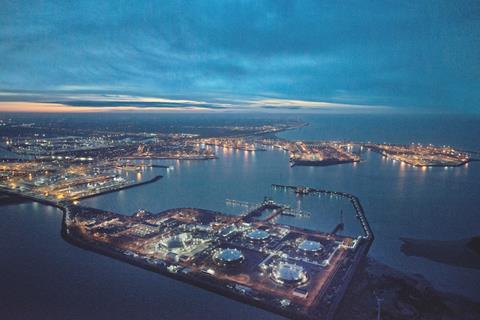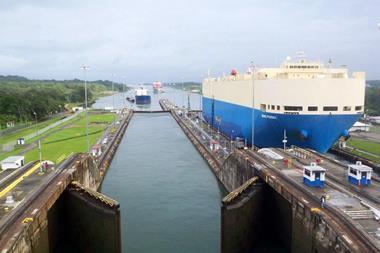The Port of Antwerp-Bruges has seen a fall in the processing of new and used passenger cars but overall throughput has increased thanks to a boost in container traffic

The ports of Antwerp and Zeebrugge handled fewer finished vehicles in 2024, with low vehicle demand and longer shipment times caused by disruption to shipping lanes in the Red Sea among the causes, according to the Port Authority of Antwerp-Bruges.
Ro-ro volumes decreased by -3.4% last year compared with 2023, with new cars down by -9.4% to 3.2m units across the year, putting volumes back near to figures recorded in 2022 (see table). Used car volumes were down -31%. Additionally, trucks were down -3.2%, while high and heavy equipment was down by -22%.
| Finished vehicle unit throughput at Antwerp-Bruges ports in 2024 | |||
|---|---|---|---|
|
2024 |
2023 |
2022 |
|
|
Imports |
1,575,267 (-7.3%) |
1,698,522 (+4.6%) |
1,624,243 |
|
Exports |
1,651,596 (-11.3%) |
1,862,138 (+13.3%) |
1,642,558 |
|
Total |
3,226,863 (-9.4%) |
3,560,660 (+9%) |
3,266,801 |
The port authority noted that Belgian passenger car sales fell by -5.8% between January and November last year, while sales of electric vehicles (EVs) in wider Europe had decreased by 5.4% (year-to-date), mainly because of a sharp decline in Germany.
In a press conference held this week (January 27) the Port of Antwerp-Bruges’ CEO Jacques Vandermeiren said that ports were now having to deal with a world less organised by shared rules and moving more into a world in which competing trading blocs were living by their own rules. He noted the uncertainty caused by Donald Trump’s return to the Whitehouse and the raft of tariff threats made in his first week there but noted that the EU had done the same with import tariffs introduced on Chinese EV imports, something Germany’s VDA criticised when the charges were imposed at the end of October. Vandermeiren said the trend toward tariffs on trade hindered imports and exports.
Vandermeiren also pointed to the geopolitical disruption that had made international shipments more volatile and cut trade in 2024. The continued war in Ukraine and sanctions taken on Russia has cut container exports from the ports of Antwerp and Zeebrugge, though the port has absorbed that loss, according to Vandermeiren. The crisis in the Red Sea and Suez Canal, in which vessels have been attacked and subsequently rerouted vessels around the bottom of Africa has also affected vessel calls and schedules, with the consequence there have been rising tariffs on containers. That said, container shipments through Antwerp-Bruges were up significantly across 2024 (TEUs +8.1% to 13.5m), which helped drive up overall tonnage through the ports to 2,777.7m tons (+2.3%).
“Over the past year, we have once again demonstrated our resilience. More than ever, the challenges we face, such as geopolitical tensions, the energy transition and complex permit processes, require cross-border cooperation and a shared vision,” said Vandermeiren. “Only then will we remain attractive to investors and maintain our strategic role as a pioneer in the industry.”
Vandermeiren also noted the serious problems with cyberattacks on cargo and cruise ports in Europe from Russia and its allies, which was Antwerp-Bruges’ number one risk, with attacks coming in every week. Russia’s recent physical presence in Europe is also a cause for concern to shipping and ports, and the absence of gas supply from Russia had meant energy prices have risen in Europe.
Read more about annual performance at Antwerp-Bruges and the other top performing vehicle-handling ports in Europe in the forthcoming spring edition of Automotive Logistics magazine and online


























![Global[1]](https://d3n5uof8vony13.cloudfront.net/Pictures/web/a/d/s/global1_726550.svgz)













No comments yet